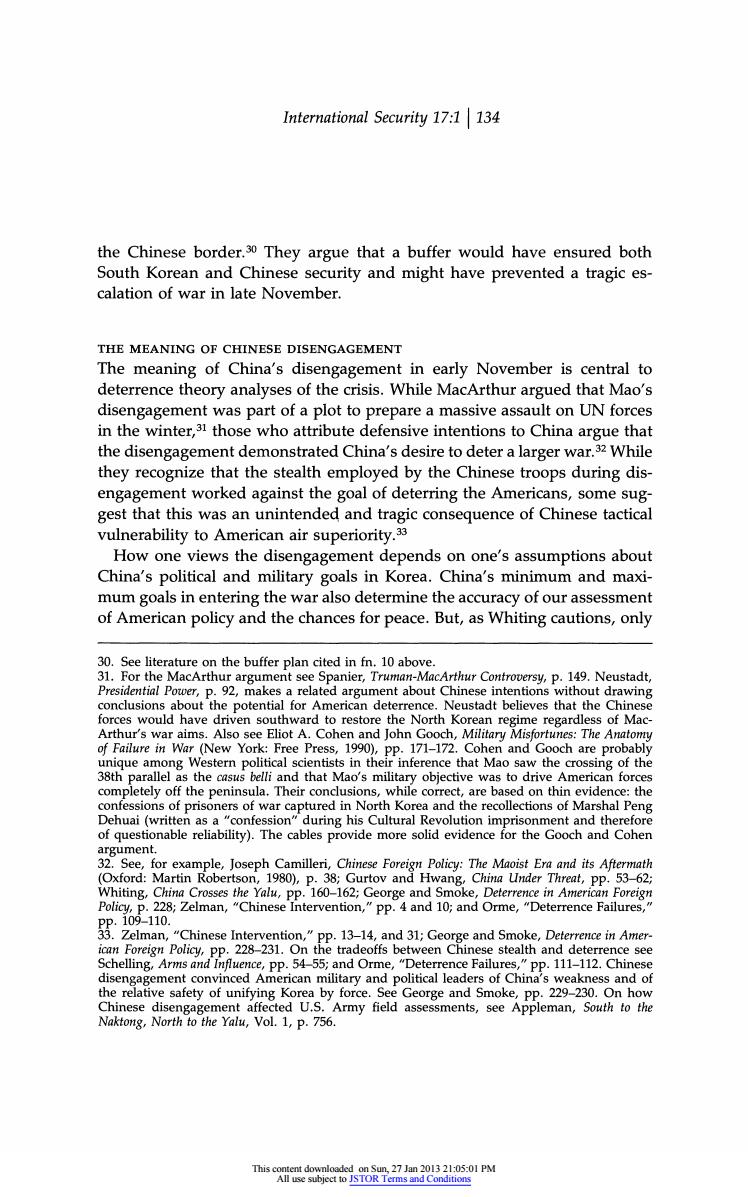正在加载图片...

International Security 17:1 134 the Chinese border.30 They argue that a buffer would have ensured both South Korean and Chinese security and might have prevented a tragic es- calation of war in late November. THE MEANING OF CHINESE DISENGAGEMENT The meaning of China's disengagement in early November is central to deterrence theory analyses of the crisis.While MacArthur argued that Mao's disengagement was part of a plot to prepare a massive assault on UN forces in the winter,31 those who attribute defensive intentions to China argue that the disengagement demonstrated China's desire to deter a larger war.32 While they recognize that the stealth employed by the Chinese troops during dis- engagement worked against the goal of deterring the Americans,some sug- gest that this was an unintended and tragic consequence of Chinese tactical vulnerability to American air superiority.33 How one views the disengagement depends on one's assumptions about China's political and military goals in Korea.China's minimum and maxi- mum goals in entering the war also determine the accuracy of our assessment of American policy and the chances for peace.But,as Whiting cautions,only 30.See literature on the buffer plan cited in fn.10 above. 31.For the MacArthur argument see Spanier,Truman-MacArthur Controversy,p.149.Neustadt, Presidential Power,p.92,makes a related argument about Chinese intentions without drawing conclusions about the potential for American deterrence.Neustadt believes that the Chinese forces would have driven southward to restore the North Korean regime regardless of Mac- Arthur's war aims.Also see Eliot A.Cohen and John Gooch,Military Misfortunes:The Anatomy of Failure in War (New York:Free Press,1990),pp.171-172.Cohen and Gooch are probably unique among Western political scientists in their inference that Mao saw the crossing of the 38th parallel as the casus belli and that Mao's military objective was to drive American forces completely off the peninsula.Their conclusions,while correct,are based on thin evidence:the confessions of prisoners of war captured in North Korea and the recollections of Marshal Peng Dehuai (written as a "confession"during his Cultural Revolution imprisonment and therefore of questionable reliability).The cables provide more solid evidence for the Gooch and Cohen argument. 32.See,for example,Joseph Camilleri,Chinese Foreign Policy:The Maoist Era and its Aftermath (Oxford:Martin Robertson,1980),p.38;Gurtov and Hwang,China Under Threat,Pp.53-62; Whiting,China Crosses the Yalu,pp.160-162;George and Smoke,Deterrence in American Foreign Policy,p.228;Zelman,"Chinese Intervention,"pp.4 and 10;and Orme,"Deterrence Failures," Pp.109-110. 33.Zelman,"Chinese Intervention,"pp.13-14,and 31;George and Smoke,Deterrence in Amer- ican Foreign Policy,pp.228-231.On the tradeoffs between Chinese stealth and deterrence see Schelling,Arms and Influence,pp.54-55;and Orme,"Deterrence Failures,"pp.111-112.Chinese disengagement convinced American military and political leaders of China's weakness and of the relative safety of unifying Korea by force.See George and Smoke,pp.229-230.On how Chinese disengagement affected U.S.Army field assessments,see Appleman,South to the Naktong,North to the Yalu,Vol.1,p.756. This content downloaded on Sun,27 Jan 2013 21:05:01 PM All use subject to JSTOR Terms and ConditionsInternational Security 17:1 1 134 the Chinese border.30 They argue that a buffer would have ensured both South Korean and Chinese security and might have prevented a tragic escalation of war in late November. THE MEANING OF CHINESE DISENGAGEMENT The meaning of China's disengagement in early November is central to deterrence theory analyses of the crisis. While MacArthur argued that Mao's disengagement was part of a plot to prepare a massive assault on UN forces in the winter,3' those who attribute defensive intentions to China argue that the disengagement demonstrated China's desire to deter a larger war.32 While they recognize that the stealth employed by the Chinese troops during disengagement worked against the goal of deterring the Americans, some suggest that this was an unintended and tragic consequence of Chinese tactical vulnerability to American air superiority.33 How one views the disengagement depends on one's assumptions about China's political and military goals in Korea. China's minimum and maximum goals in entering the war also determine the accuracy of our assessment of American policy and the chances for peace. But, as Whiting cautions, only 30. See literature on the buffer plan cited in fn. 10 above. 31. For the MacArthur argument see Spanier, Truman-MacArthur Controversy, p. 149. Neustadt, Presidential Power, p. 92, makes a related argument about Chinese intentions without drawing conclusions about the potential for American deterrence. Neustadt believes that the Chinese forces would have driven southward to restore the North Korean regime regardless of MacArthur's war aims. Also see Eliot A. Cohen and John Gooch, Military Misfortunes: The Anatomy of Failure in War (New York: Free Press, 1990), pp. 171-172. Cohen and Gooch are probably unique among Western political scientists in their inference that Mao saw the crossing of the 38th parallel as the casus belli and that Mao's military objective was to drive American forces completely off the peninsula. Their conclusions, while correct, are based on thin evidence: the confessions of prisoners of war captured in North Korea and the recollections of Marshal Peng Dehuai (written as a "confession" during his Cultural Revolution imprisonment and therefore of questionable reliability). The cables provide more solid evidence for the Gooch and Cohen argument. 32. See, for example, Joseph Camilleri, Chinese Foreign Policy: The Maoist Era and its Aftermath (Oxford: Martin Robertson, 1980), p. 38; Gurtov and Hwang, China Under Threat, pp. 53-62; Whiting, China Crosses the Yalu, pp. 160-162; George and Smoke, Deterrence in American Foreign Policy, p. 228; Zelman, "Chinese Intervention," pp. 4 and 10; and Orme, "Deterrence Failures," pp. 109-110. 33. Zelman, "Chinese Intervention," pp. 13-14, and 31; George and Smoke, Deterrence in American Foreign Policy, pp. 228-231. On the tradeoffs between Chinese stealth and deterrence see Schelling, Arms and Influence, pp. 54-55; and Orme, "Deterrence Failures," pp. 111-112. Chinese disengagement convinced American military and politicaleaders of China's weakness and of the relative safety of unifying Korea by force. See George and Smoke, pp. 229-230. On how Chinese disengagement affected U.S. Army field assessments, see Appleman, South to the Naktong, North to the Yalu, Vol. 1, p. 756. This content downloaded on Sun, 27 Jan 2013 21:05:01 PM All use subject to JSTOR Terms and Conditions